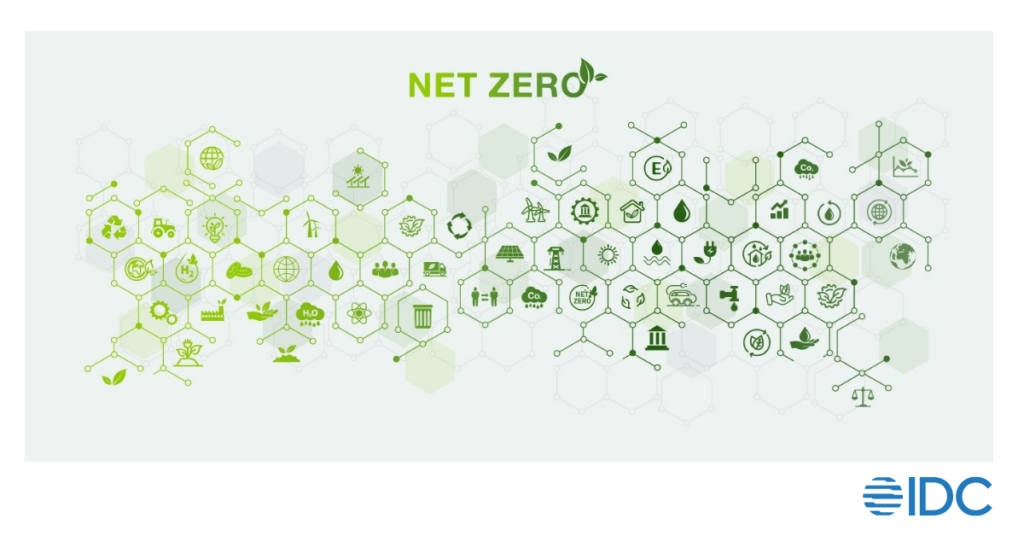New research from IDC reveals that the larger topic of sustainability/environmental, social, and corporate governance (ESG) is now becoming imbedded into organizations’ activities, strategies, planning, and objectives to an unprecedented degree.
The information and communications technology (ICT) industry is playing a crucial role in reaching the overarching goal of net zero. ICT and engineering services focused on energy efficiency represent the means to tackle environmental challenges such as curtailing carbon footprints; a major contributor to global warming.

Pursuing Sustainability Is a Business Necessity
Sustainability goals, which were once perceived as “nice to have”, became “must have” once organizations realized that pursuing sustainability creates business value. Public and private sector organizations across different continents, industries, and roles have experienced the tangible business benefits of incorporating sustainability into their operations.
This has been happening consistently through either top-line improvements, like increased revenue and profit, to bottom-line improvements like lower costs. In some cases organizations are seeing benefits in both top- and bottom-line improvements.
According to IDC’s Future Enterprise Resiliency and Spending Survey, Wave 4, almost two-fifths of line of business (LOB) managers have improved their financial performance or expect to do so as a result of sustainability-related investments.
Sustainability Is Unequivocally Linked to IT Efficiency
Forward-looking organizations understand that ESG objectives are closely associated with IT efficiency improvements. This is illustrated by the following findings from various economic sectors and business personas like IT, LOB, C-level executives, and more:
- IT infrastructure and software efficiency improvements are top of mind with respect to sustainability-focused initiatives.
- Respondents from North America and Europe share the same set of leading sustainability priorities. Respondents from Asia/Pacific differed in the choice of top priorities and degree of urgency.
- Priorities differ among industries. Manufacturing organizations regard sustainability initiatives as highly important, fully recognizing the business benefits of improved efficiency across the technology stack in infrastructure, software, and energy management.
- Energy management/efficiency was also ranked highly in the utilities and transportation industries. Supply chain was singled out as important by organizations in retail and healthcare.
The ICT Industry Has the Means to Be Part of the Solution
ICT (both infrastructure and software), along with human capital such as IT departments, are instrumental in realizing sustainability-focused projects that help organizations succeed on their respective journeys to becoming sustainable enterprises.
The ICT industry is partly responsible for around 3–4% of global carbon emissions. At the same time, the industry has an unparalleled opportunity to become part of the solution to current ecological problems. To do that, the ICT industry must meet one fundamental condition to enable organizations to achieve their respective sustainability goals. ICT itself must be sustainable.
Sustainable ICT
Sustainable ICT implies that ICT hardware infrastructure, software, and delivery models possess such attributes as energy efficiency, adherence to circular economy principles, and life cycle management capability. ICT must pass the test whether sustainability attributes are embedded in ICT products and solutions, how they perform from a sustainability perspective, and how sustainable they are per se.
IT efficiency, energy efficiency, and the extension of product life cycle, leading to a reduction in resource consumption, represent the shared attributes of sustainable ICT. This leads to reduction of operational costs, and increases attractiveness for vendors’ current and potential employees.
Sustainable ICT pertains to the full technology stack, processes, and best practices. Yet, the key component is represented by hardware infrastructure, including energy-efficient processors, servers, ITAM/ITAD, ICT infrastructure delivery models, energy efficient ICT infrastructure like low carbon data center designs and cooling solutions, and sustainable software lifecycle.
Competitive Landscape
IT equipment vendors such as Cisco, HPE, Dell, and IBM, along with other IT product manufacturers realized the importance of sustainable IT early on and are now benefitting from their long-standing efforts to incorporate principles of circular economy and product efficiency into IT product delivery.
IT equipment vendors hold the largest mindshare of IT users when it comes to sustainability/ESG projects. IT consultants, systems integrators and sustainability consulting specialists follow suit, as their services are in demand for two primary reasons: first, to help navigate the complex ESG regulatory environment and second, to help implement sustainable products and services.
Nevertheless, the competitive field by far is not limited to the above-mentioned groups of providers. Thanks to the diverse nature of use cases related to sustainability/ESG, numerous ICT vendor and service providers like hardware and software vendors, cloud providers, sustainability specialists, IT engineering firms, compete for recognition, thereby enhancing the quality and competitiveness of the field.
For more insight and information on the trends in sustainability and ESG policies, please see IDC’s Sustainable Technologies and Strategies program.




